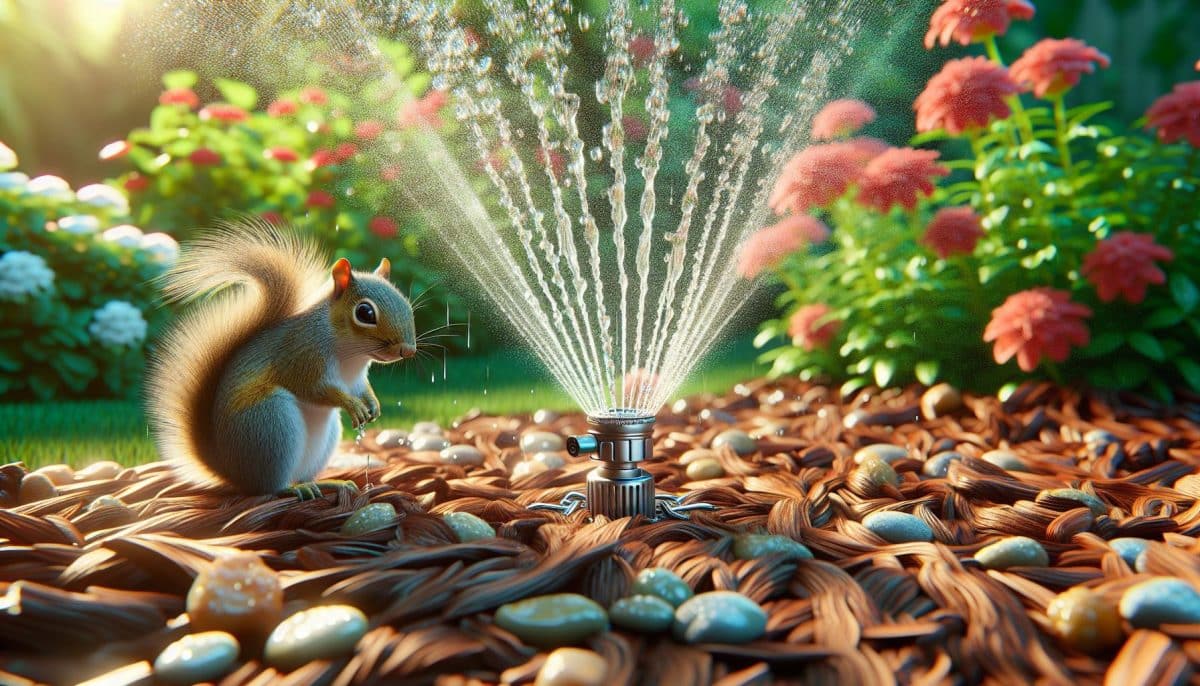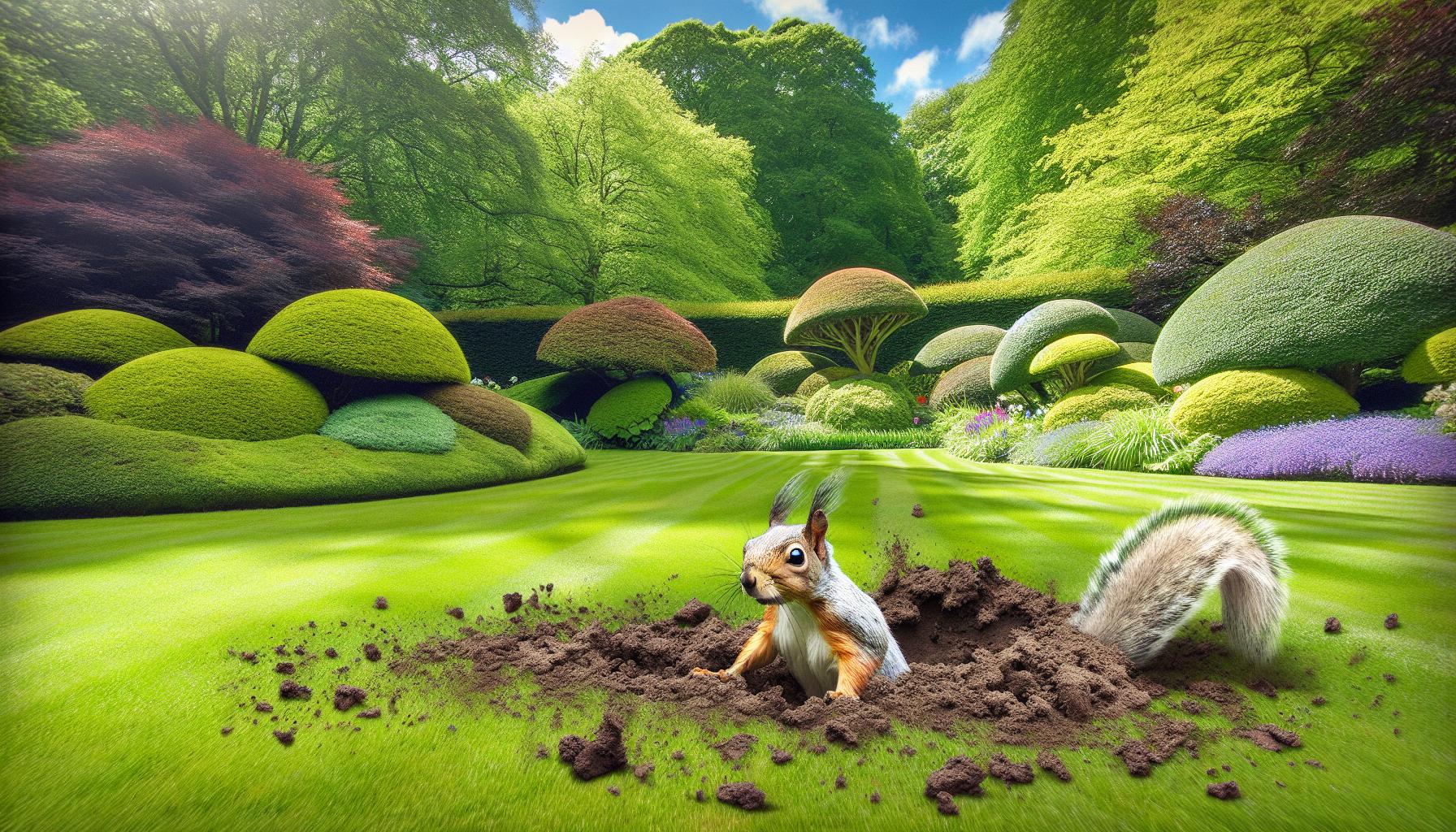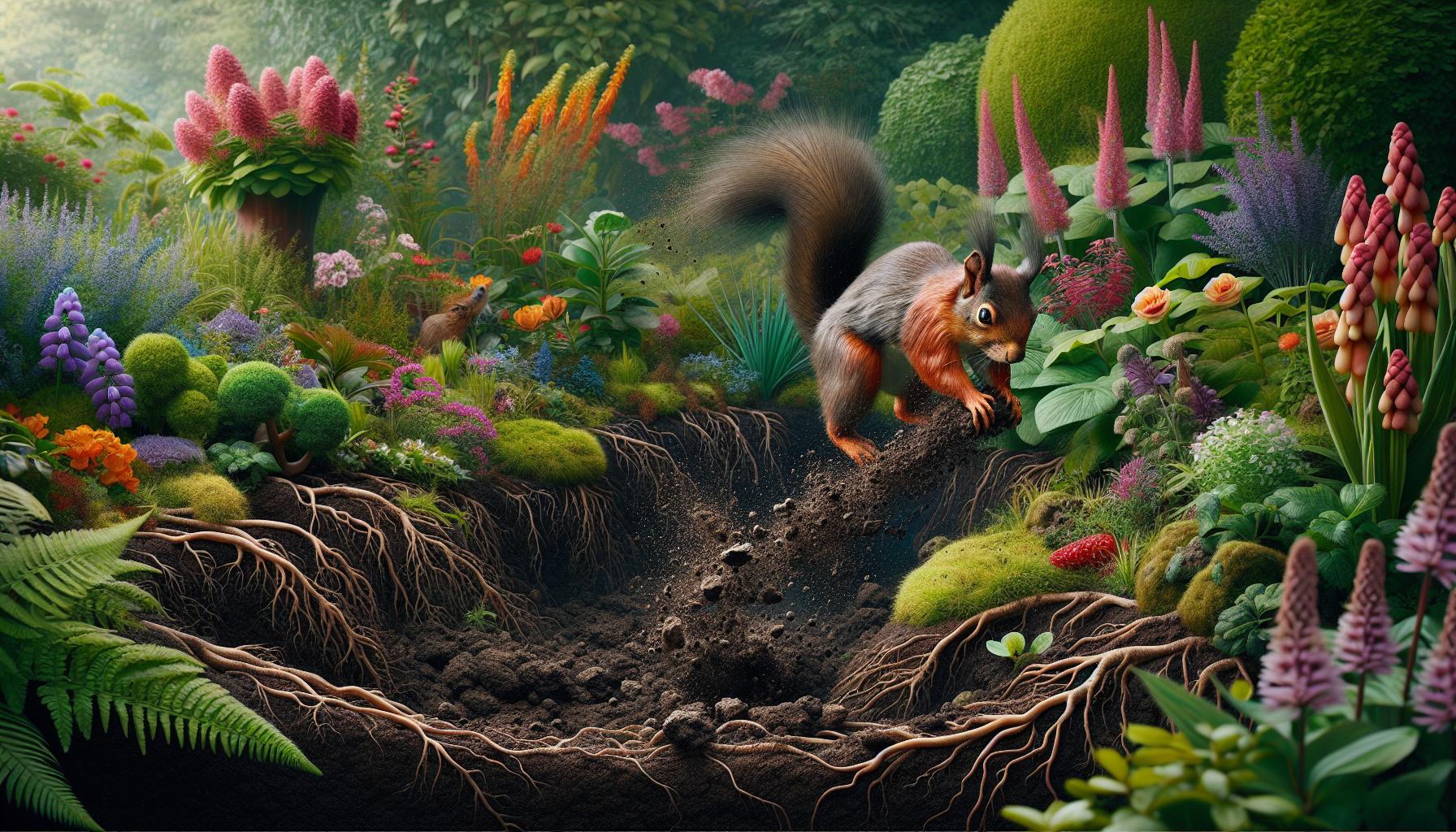
Picture this: you’ve just spent your weekend perfecting your garden, each flower and blade of grass meticulously placed, only to wake up to a battlefield. Your yard, now littered with holes, looks like it’s hosted a squirrel rave. It’s frustrating, isn’t it? These furry little diggers, as cute as they can be, seem to have a personal vendetta against manicured lawns.
But why do they do it? Well, squirrels are nature’s treasure hunters, always on the lookout for their next big find, be it a nut or a seed. Your garden, to them, is a treasure chest waiting to be plundered. But, before you raise the white flag and surrender your garden to these relentless foragers, there’s hope.
In this guide, you’ll discover not just why these fluffy-tailed bandits are turning your garden upside down, but how to gently persuade them to move their operations elsewhere. From simple tweaks to your daily routine to ingenious garden hacks, we’ve got the lowdown on turning your yard into a no-go zone for squirrels—all without harming a single whisker on their heads. Stay tuned, because you’re about to become the master of your domain once more, with a squirrel-proof garden to prove it.
Understanding Squirrel Behaviour
Ever wondered why your orderly garden suddenly looks like a treasure map, with X marks the spot all over? Instead of gold, you find holes dug up by none other than squirrels. But before grabbing your gardening tools in frustration, let’s dive deep into the minds of these furry intruders. Why should you care? Understanding squirrel behaviour is akin to learning the moves of your chess opponent; it makes your counter-strategies more effective and less of a guessing game.
You might have observed squirrels bustling around, particularly during early mornings or late afternoons. This isn’t just random play. Squirrels are on a mission, acting on their instinct to stash away food for leaner times. They’re not purposely trying to sabotage your gardening efforts. Instead, they’re driven by survival instincts, searching for the perfect spots to bury their treasure troves of nuts and seeds. This insight might soften your view on their garden escapades, realizing it’s not mischief but a natural wildlife cycle at play.
Consider the personal quest of a gardener friend who tried everything to deter squirrels, from scare tactics to barriers, only to continue finding freshly dug holes every morning. The breakthrough came when they shifted focus from deterrence to understanding. By studying squirrel patterns, they anticipated the critters’ moves, securing vulnerable garden spots proactively. This story isn’t just about successful garden protection; it’s a testament to the power of empathy and understanding in solving conflicts with wildlife.
Squirrels are creatures of habit yet adaptable. They mark territories, return to familiar spots, and yet, when faced with obstacles, they’ll innovate. This insight is crucial. When you understand their behaviour, you can predict their next moves, making your garden less inviting for their foraging expeditions. Sudden noises or movements might momentarily deter them, but a deeper understanding of their motives and patterns is your best strategy for a long-term solution.
So why care about the angle of understanding squirrel behaviour? Simply put, it transforms your approach from reactionary to strategic, ensuring your garden remains a sanctuary for you, not a battlefield.
Reasons for Squirrel Digging

Ever watched a squirrel and thought, “What’s going through that tiny mind?” Well, you’re not alone. Picture this: a beautifully manicured lawn, your personal slice of paradise. Then along comes a squirrel, leaving it looking like Swiss cheese. Why do they do it?
For starters, survival. These little critters dig to stash their finds, ensuring a food supply for leaner times. It’s not personal; it’s primal. Imagine relying on what you can bury today to eat tomorrow. Puts things into perspective, doesn’t it?
But here’s another angle: curiosity. Squirrels are natural explorers. Your garden isn’t just a garden to them; it’s a never-ending buffet of mysteries. Now, think about that waterskiing squirrel. Not all squirrels can be internet sensations, but given the chance, they’d all certainly try to be as adventurous.
So, why should you care? Because understanding leads to coexistence. Realising that these actions aren’t malicious but rather instinctual and sometimes, just plain boredom, shifts the narrative. This isn’t about a rodent vendetta; it’s about cohabiting with nature, even when it’s digging up your dahlias.
Let’s flip the script. Instead of waging war, why not outsmart them? Moving from frustration to anticipation, you can safeguard your garden and, perhaps, even enjoy the antics of your furry neighbours. Now, wouldn’t that be something?
The Damage Caused by Squirrels

Ever strolled through your garden only to find your cherished bulbs uprooted or your fresh plantings looking like a buffet aftermath? If so, you’ve likely met the furry little culprits responsible—squirrels. Now, why should you care? Beyond the obvious frustration and potential loss of your garden’s beauty, there’s a deeper issue at play here. Understanding the extent of damage caused by squirrels isn’t just about tallying up ruined plants—it’s about recognising the ripple effect on your garden’s ecosystem.
Squirrels, with their sharp teeth and persistent nature, don’t just stop at bulbs. They Can Wreak Havoc on young trees, stripping bark and leaving them vulnerable. Thought those shallow holes scattered across your lawn were just unsightly? Think again. They’re evidence of squirrels stashing away their finds, disrupting the health of your lawn and the growth of nearby plants and trees.
But here’s the kicker, it’s not all doom and gloom. By understanding the ‘why’ behind their digging and gnawing—be it survival or plain curiosity—we can start to appreciate these critters for their role in our gardens. They’re not just pests; they’re participants in the ecosystem. This perspective shift doesn’t just alleviate the headache of dealing with squirrel damage; it opens up a dialogue about coexistence and responsible management.
So, as you pause to consider the next steps in safeguarding your garden, remember the battle against squirrel damage is as much about protection as it is about respect for nature’s intricacies.
Non-harmful Methods to Deter Squirrels

Ever found yourself waging a silent war against the fluffy-tailed invaders in your garden? You’re not alone. It’s a common plight many face, but the solution doesn’t have to be a battlefield. Let’s flip the script and talk about ways to deter squirrels that don’t harm them—or your peace of mind.
Embrace the Power of Repellents
First off, why go the harsh route when nature’s got your back? Inorganic mulch—think pebbles, gravel, or even rubber chips—can be a game changer. Picture this: a barrier so irksome to those tiny paws, they’d rather skip your garden than dig through the equivalent of a toddler’s worst Lego nightmare. Layering gravel over chicken wire? Now that’s a fortress. Squirrels detest the stubborn texture, and honestly, who can blame them?
The Element of Surprise
Imagine you’re a squirrel, merrily hopping around, and suddenly water sprays your way. You’d bolt, right? Enter motion-activated sprinklers. It’s like setting up a harmless prank that consistently delivers. These sprinklers create a sudden movement or sound, playing on the squirrels’ natural instinct to flee danger. It’s effective, non-harmful, and let’s admit it, slightly entertaining to witness.
Understanding these gentle yet effective methods, wouldn’t you rather choose a path of coexistence? It’s about outsmarting, not outfighting. After all, sharing our space with wildlife, even the occasionally troublesome kind, enriches our experience of the natural world. And who knows, with these strategies, you might just find your garden becomes a peaceful haven for both you and the squirrels.
Conclusion
Protecting your garden from squirrels doesn’t have to be a battle. By opting for inorganic mulch and motion-activated sprinklers, you’re choosing methods that safeguard your plants while ensuring squirrels remain unharmed. It’s all about balance and finding solutions that benefit both you and the local wildlife. Remember, the goal is peaceful coexistence, allowing you to enjoy a thriving garden without disrupting the natural ecosystem. With these strategies, you’re well on your way to achieving just that.
Colin Macmillan is a seasoned entrepreneur and the CEO of Riverwood Landscape, a leading landscaping company based in Canada. He has been at the helm of the company since leaving high school, demonstrating his strong leadership skills and business acumen.
Colin’s expertise lies in various aspects of landscaping, including lawn care, interlocking, sod installation, and commercial maintenance. His hands-on approach and dedication to the craft have been instrumental in building Riverwood Landscape into a reputable brand.
One of his most notable achievements is the creation of a successful landscape franchise that services multiple locations. This accomplishment underscores his strategic thinking and ability to scale operations effectively.
Colin has also had the privilege of working with Guelph Hospital for landscaping and maintenance, a testament to the trust and reliability that his company has earned over the years.
His professional mission is to offer the best services and experiences for customers, a goal that he tirelessly pursues. Colin’s commitment to excellence and customer satisfaction continues to drive the growth and success of Riverwood Landscape.








